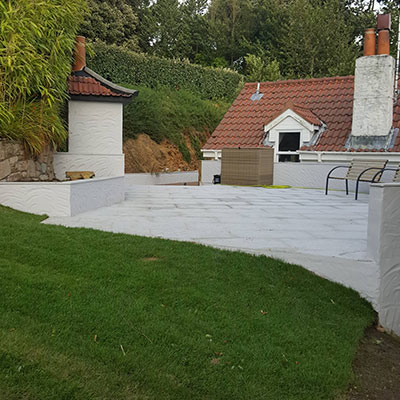This post was originally published on The Garden Continuum.
Every homeowner attempting a landscape project starts out with the best intentions. Regardless of size, every project usually begins with a desire to make improvements – perhaps a redesigned garden space, or the installation of a patio, fire pit, or some other hardscape feature to add versatility and opportunities for relaxation or recreation.
As the project gets underway, excitement, anxiety – or both – might set in, causing confusion and frustration that could stall progress. Worse, mid-project stress can lead to disagreements, strained relationships, or even a failed project. This certainly no way to create beauty and harmony in the landscape. It’s important to work toward minimizing disruption and maintaining peace of mind in order to avoid interruptions and arguments.
Set yourself up to win early
If you’re a homeowner who starts to feel overwhelmed by a landscape project, you might see quitting as the best solution, but it rarely is. It’s just a way out of an uncomfortable situation. Instead, set yourself up to win early by breaking larger projects up into smaller pieces. As you tackle and complete them in an orderly fashion, you begin to build confidence and momentum from this series of small successes. In what seems like no time at all, you’ve suddenly completed your entire project.
There are six key factors to successfully approaching landscape projects – what I call the “Life-Scape Method”. It’s a proven, reliable method that can help guarantee the success of your projects:
1. Embrace the “Winner Effect”
In his book The Winner Effect, author Ian Robertson describes a biological phenomenon in which animals that win a few, small fights are more likely to win a larger fight in the future. This phenomenon applies to humans and our landscape projects as well. We feed off the positive energy and sense of accomplishment produced by smaller project wins, gaining the confidence to successfully complete larger projects. Once you start winning, it’s hard to stop.
2. Clarify what “easy” means to you in terms of time, money, and effort
What an individual considers “easy” is generally determined by the amount of time, money, and effort something takes. Things that take very little of these three elements are usually “easy” to do. They’re not tough decisions to make and the chance for successful completion is high, so create project-development boundaries around them and the limits they present. Here are some tips to help you minimize the negative effects of these elements:
- Time: Start with a project that’s a high priority and doesn’t take much time. That should be an easy win.
- Money: Focus on cost-effective solutions that provide the biggest bang for the buck. It’s easier to complete a project that has a big payoff.
- Effort: Everyone has a limit as to how much work they’re willing to do. If you’re facing a project that’s a real struggle, break it into, say, three smaller projects ranked by priority. Focus on the one with the highest priority and get it done. The other two can follow as time and circumstances allow. Do NOT do them out of order because that can cause problems that’ll take more money to fix.
To make things even easier, avoid creating a situation that can increase risk and struggle by conducting a thorough site analysis of the area, including taking accurate measurements, checking light exposure, creating a plant inventory, and analyzing soil samples.
3. Define landscape success criteria
Before you launch into a project, think about how it will end. Write an “outcome statement,” noting how you will feel after the successful completion of your project:
- What problem(s) are you solving?
- What will you gain from the project?
- How will your life be different?
- How will you feel?
This brief document will help keep your project on track and you focused on the prize.
4. Embrace partnerships to help get your win
Let’s face it: it can be hard to make an objective, unbiased assessment of our own abilities. Many of us think we are capable of doing more than we really can. When it comes to landscape projects, there are three basic roles you can play, based on your abilities and willingness:
- Director: you oversee the planning and high-level project organization, but you hire a crew to do the actual work
- Actor: you’re in the middle of things, doing the work and executing the plan
- Audience: you prefer to put the project entirely in the hands of professionals, then sit back and watch it all come together
Choosing to partner with professionals at some level is often the smartest way to go. By acknowledging where you lack certain abilities (hey, none of us is excellent at everything!) or simply lack the time to do things, you can compensate by hiring the skill sets needed for your project to succeed. Think of partnering as an insurance plan for success.
Here are five tips for picking the right professional landscaping partner:
- Choose Certified Landscape Professionals – Take advantage of state and national databases that can connect you with certified professionals, then check out their locations and meet their staff
- Check for insurance – There is a significant liability in landscape work, so insurance is important for both sole proprietors and contractors
- Look at past landscape projects – Look for their process and their approach, not their experience in every little area of your project
- Check references – Ask the pro to provide references and call on your network for recommendations
- Go for warm & fuzzy – Who you work with can be just as important as what they do. Pick someone who aligns with your values to avoid misunderstandings
5. Consider phasing your project with milestone wins
As I mentioned earlier, larger projects benefit from being broken into smaller pieces that can produce more wins, building momentum toward successful completion.
Not sure how to divide up your project? Based on your outcome statement, list all of the actions that need to be taken to make your landscaped space functional, not perfect. Each of these actions becomes a milestone, for example:
- You’ve reorganized an overgrown bed
- You’ve made an area more accessible – perhaps cleared brush or made a temporary path in advance of installing a beautiful walkway
- You’ve made a sitting area with lawn chairs for now while you wait for your new Adirondack chairs to be delivered
- You’ve improved the view from your kitchen window by ripping out the dead shrub blocking it; you’ll do a new, more appropriate planting when the season allows
Set seasonal checkpoints to hold yourself accountable for completing the project and to allow for seasonal timeline adjustments, as the last example illustrates.
If your project could take many months, or even years, consider a temporary solution that will provide the functionality you’re looking for right now, but that you’ll have no problem replacing later with your much better, permanent design.
6. Starting is the only way to get the win
Proper planning is the cornerstone of quality landscape work, but at some point, you have to actually get your hands dirty. Your plan will inevitably require some changes, so don’t let the planning keep you from starting. Set a start date and keep it.
In fact, doing the actual work may help you bring any unclear parts of your plan into focus. Remember the Winner Effect – as you start to accumulate small wins, you build excitement and confidence to take on the bigger challenges. Think done over perfect. Chasing perfection will only cause frustration and risk having the project spin out of control.
Don’t know where to start? Hire a landscape professional to assess your property and give you a clear picture of how things need to go. Objective, third-party input can provide the clarity and insight needed to create a realistic to-do list and timeline – for example, an expert may point out that your irrigation system needs improvement before you can put in a new lawn. Think of your project holistically to avoid frustration: it’s now not just a new lawn, it includes an improved irrigation system so you can successfully install a new lawn, and that becomes your new starting point.
A way forward
Early wins will give you a sense of satisfaction and accomplishment that will keep you motivated. That kind of positive energy opens you up to learning, which takes away the fear of the unknown and minimizes the feeling of being overwhelmed by a project that can potentially affect your well-being and relationships.
When you have a plan you have stability and a roadmap to success, which instils confidence, enabling you to turn challenges into exciting opportunities for growth and discovery.
If you still need help with landscaping your garden, get in touch with our gardening team and let us bring your visions to life.


